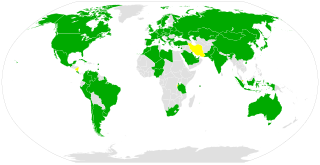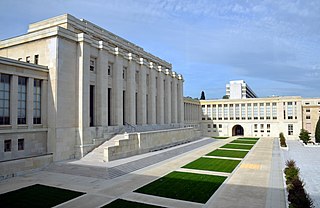
The Council of Europe is an international organisation with the goal of upholding human rights, democracy and the rule of law in Europe. Founded in 1949, it brings together 46 member states with a population of approximately 675 million as of 2023; it operates with an annual budget of approximately 500 million euros.

The Convention on Biological Diversity (CBD), known informally as the Biodiversity Convention, is a multilateral treaty. The Convention has three main goals: the conservation of biological diversity ; the sustainable use of its components; and the fair and equitable sharing of benefits arising from genetic resources. Its objective is to develop national strategies for the conservation and sustainable use of biological diversity, and it is often seen as the key document regarding sustainable development.

The World Intellectual Property Organization is one of the 15 specialized agencies of the United Nations (UN). Pursuant to the 1967 Convention Establishing the World Intellectual Property Organization, WIPO was created to promote and protect intellectual property (IP) across the world by cooperating with countries as well as international organizations. It began operations on 26 April 1970 when the convention entered into force. The current Director General is Singaporean Daren Tang, former head of the Intellectual Property Office of Singapore, who began his term on 1 October 2020.

The World Trade Organization (WTO) is an intergovernmental organization headquartered in Geneva, Switzerland that regulates and facilitates international trade. Governments use the organization to establish, revise, and enforce the rules that govern international trade in cooperation with the United Nations System. The WTO is the world's largest international economic organization, with 164 member states representing over 98% of global trade and global GDP.

The Commonwealth of Independent States (CIS) is a regional intergovernmental organization in Eurasia. It was formed following the dissolution of the Soviet Union in 1991. It covers an area of 20,368,759 km2 (7,864,422 sq mi) and has an estimated population of 239,796,010. The CIS encourages cooperation in economic, political, and military affairs and has certain powers relating to the coordination of trade, finance, lawmaking, and security, including cross-border crime prevention.
The Northwest Atlantic Fisheries Organization (NAFO) is an intergovernmental organization with a mandate to provide scientific advice and management of fisheries in the northwestern part of the Atlantic Ocean. NAFO is headquartered in Halifax, Nova Scotia, Canada.
The original member states of theWorld Trade Organization are the parties to the General Agreement on Tariffs and Trade (GATT) after ratifying the Uruguay Round Agreements, and the European Communities. They obtained this status at the entry into force on 1 January 1995 or upon their date of ratification. All other members have joined the organization as a result of negotiation, and membership consists of a balance of rights and obligations. The process of becoming a World Trade Organization (WTO) member is unique to each applicant country, and the terms of accession are dependent upon the country's stage of economic development and the current trade regime.

The Convention on Registration of Objects Launched into Outer Space was adopted by the United Nations General Assembly in 1974 and went into force in 1976. As of February 2022, it has been ratified by 72 states.

An international organization, also known as an intergovernmental organization or an international institution, is an organization that is established by a treaty or other type of instrument governed by international law and possesses its own legal personality, such as the United Nations, the World Health Organization, International Union for Conservation of Nature, and NATO. International organizations are composed of primarily member states, but may also include other entities, such as other international organizations, firms, and nongovernmental organizations. Additionally, entities may hold observer status. An alternative definition is that an international organization is a stable set of norms and rules meant to govern the behavior of states and other actors in the international system.

In the European Union (EU), enhanced cooperation is a procedure where a minimum of nine EU member states are allowed to establish advanced integration or cooperation in an area within EU structures but without the other members being involved. As of October 2017, this procedure is being used in the fields of the Schengen acquis, divorce law, patents, property regimes of international couples, and European Public Prosecutor and is approved for the field of a financial transaction tax.

EUCLID, also called Pôle Universitaire Euclide or Euclid University, is an international intergovernmental organization with a university charter established in 2008. It has official headquarters in The Gambia and in the Central African Republic, but also maintains an executive office in Washington, D.C. Its primary mandate is to train officials for its Participating States but its programs are also offered to the general public. The institution's current Secretary-General is Winston Dookeran.
The Holy See is not a member of the United Nations but was granted permanent observer state status on 6 April 1964. In that capacity, it has the right to attend all sessions of the United Nations General Assembly, the United Nations Security Council, and the United Nations Economic and Social Council to observe their work. Accordingly, the Holy See has established permanent observer missions in New York and in Geneva and has been able to influence the decisions and recommendations of the United Nations.

The European Space Agency (ESA) was founded in 1975 when the European Space Research Organisation (ESRO) merged with the European Launcher Development Organisation (ELDO). The ESA Convention was signed by the ESRO and ELDO members on 30 May 1975 and by Ireland on 31 December 1975. Canada signed a Cooperation Agreement on 9 December 1978. The Convention entered into force on 30 October 1980 after the ratification procedures in the 10 ESRO/ELDO members were finalised.

Iran is a member of the WIPO since 2001 and has acceded to several WIPO intellectual property treaties. Iran joined the Convention for the Protection of Industrial Property in 1959. In December 2003 Iran became a party to the Madrid Agreement and the Madrid Protocol for the International Registration of Marks. In 2005 Iran joined the Lisbon Agreement for the Protection of Appellations of Origin and their International Registration, which ensures the protection of geographical names associated with products. As at February 2008 Iran had yet to accede to The Hague Agreement for the Protection of Industrial Designs.

The Council of Europe was founded on 5 May 1949 by ten western and northern European states, with Greece joining three months later, and Iceland, Turkey and West Germany joining the next year. It now has 46 member states, with Montenegro being the latest to join.

The Memorandum of Understanding (MoU) Concerning the Conservation of the Manatee and Small Cetaceans of Western Africa and Macaronesia is a Multilateral Environmental Memorandum of Understanding and entered into effect on 3 October 2008 under the auspices of the Bonn Convention. The MoU covers 29 range States. As of August 2012, 17 range States have signed the MoU, as well as a number of cooperating organizations.
Since Kosovo's declaration of independence from Serbia, international recognition of Kosovo has been mixed, and the international community continues to be divided on the issue. The Republic of Kosovo is member of some international intergovernmental and international non-governmental organisations.

The African Continental Free Trade Area (AfCFTA) is a free trade area encompassing most of Africa. It was established in 2018 by the African Continental Free Trade Agreement, which has 43 parties and another 11 signatories, making it the largest free-trade area by number of member states, after the World Trade Organization, and the largest in population and geographic size, spanning 1.3 billion people across the world's second largest continent.

 Algeria
Algeria  Angola
Angola  Argentina
Argentina  Barbados
Barbados  Benin
Benin  Bolivia
Bolivia  Brazil
Brazil  Burundi
Burundi  Cabo Verde
Cabo Verde  Cambodia
Cambodia  China
China  Côte d'Ivoire
Côte d'Ivoire  Cuba
Cuba  North Korea
North Korea  Dominican Republic
Dominican Republic  Ecuador
Ecuador  Egypt
Egypt  Gabon
Gabon  Ghana
Ghana  Guyana
Guyana  Honduras
Honduras  India
India  Indonesia
Indonesia  Iran
Iran  Iraq
Iraq  Jamaica
Jamaica  Jordan
Jordan  Liberia
Liberia  Libya
Libya  Malawi
Malawi  Malaysia
Malaysia  Mali
Mali  Mauritius
Mauritius  Micronesia
Micronesia  Morocco
Morocco  Mozambique
Mozambique  Namibia
Namibia  Nicaragua
Nicaragua  Nigeria
Nigeria  Pakistan
Pakistan  Palestine
Palestine  Panama
Panama  Philippines
Philippines  Seychelles
Seychelles  Sierra Leone
Sierra Leone  South Africa
South Africa  Sri Lanka
Sri Lanka  Sudan
Sudan  Suriname
Suriname  Tanzania
Tanzania  Uganda
Uganda  Venezuela
Venezuela  Vietnam
Vietnam  Zimbabwe
Zimbabwe  Colombia (signed in 1994; ratified in 1997; denounced in 2007)
Colombia (signed in 1994; ratified in 1997; denounced in 2007) Serbia and Montenegro (signed in 1994; ratified in 1996)
Serbia and Montenegro (signed in 1994; ratified in 1996)











